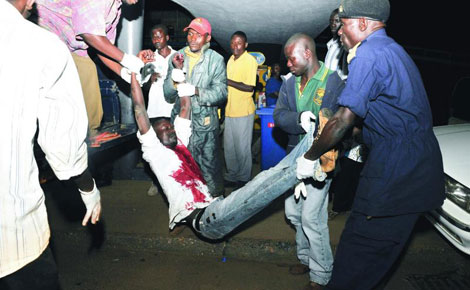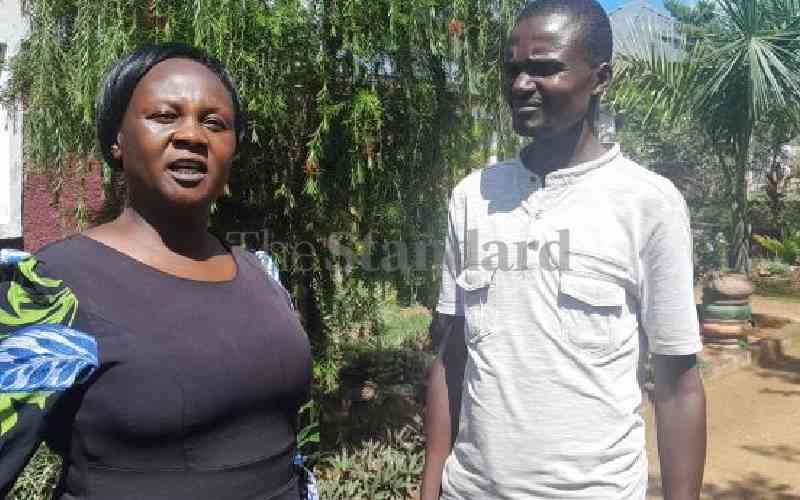 |
|
Locals carry a man, injured in an explosion after he arrived for treatment at the Mulago Hospital in Kampala, Uganda, on July 12. Two separate explosions killed at least 23 people in bars while watching the World Cup fi nal. [PHOTO/ FILE/ STANDARD] |
Kenya: Puzzling contradictions in the legal handling of terror suspects are painfully illustrated through various court cases.
On July 29, 2010, Agade’s father Hassan Elijuma Agade, filed an application before the High Court on his behalf for him to be produced in court on or before August 2, 2010.
On August 2, 2010, Anti-Terror Police Unit (ATPU) officer Charles Ogeto filed a replying affidavit against the harbeas corpus—a writ that requires a person under arrest to be brought before a judge.
He admitted that ATPU had arrested Agade and handed him to Ugandans.
Mr Ogeto wanted the court not to agree to the application stating, “the subject is therefore outside the jurisdiction of this court and no longer in the custody of the respondents.”
However, on September 20, 2010, Omar’s wife, Rabia Mohammed, filed an application for the Habeas Corpus in Nairobi on his behalf. It was issued the following day. Two days later on September 22, ATPU officer Inspector Newton Mwiti filed an affidavit saying it was “an outrageous claim” that ATPU kidnapped the rendered persons.
He further stated that Omar was not under the custody of the Kenyan police and thus they were not in a position to produce him before the High Court. Idris, one of the suspects, says in his affidavits that a Captain Buete of the Ugandan military was involved in his arrest in Kawangware.
The Ugandan military, however, denied carrying out any arrests on Kenyan soil. Would it be illegal for Kenyan officials to send the suspects to Uganda? The Extradition Contiguous and Foreign Countries Act stipulates the transfer of a fugitive for trial in another country.
“The Director of Public Prosecutions (DPP) has to apply to the Attorney General who refers to the Foreign Affairs Minister of his country to request for the transfer of the suspect,” Asan Kasingye , an Assistant Inspector General of Police, and Uganda’s current Director of Interpol and International Relations explains the extradition process.
REQUESTED FOR REFERRAL
Kasingye adds: “The Foreign Affairs Minister then writes to his counterpart who asks the AG who then requests the DPP to order for an arrest for the suspect to be produced in court for an extradition hearing.”
However, Mr Kasingye said they “acted through the East African treaty” adding “Interpol is aware that Uganda did not hijack anyone from any country. No suspect of this crime was kidnapped from another country.”
Together with four Ugandans and a Tanzanian, the Kenyan suspects accuse the Ugandan government of deliberately delaying hearing of the petition to ensure their prolonged detention without being tried.
At first, the cases were delayed after the suspects requested for referral to the constitutional court in Uganda that had failed to meet for about four years due to lack of quorum. On December 2, 2010, the suspects filed an application for judicial review against the Ugandan Attorney General as the respondent.
They requested the judge to declare their enforced removal from Kenya “by the Kenyan police in collaboration with the Ugandan police force and or security agents and handing over and surrender to the Uganda police and other Uganda security agents without extradition proceedings and or judicial orders of extradition as unlawful, illegal and blatant breach of their rights.”
Stay informed. Subscribe to our newsletter
The suspects first faced the courts from September 12 to 14, 2011 when they were indicted before the International Crimes Division of the High Court (ICD) in Kampala, a court formerly known as the War Crimes Division of the High Court set under the Juba Peace Process to try the persons alleged to have committed war crimes and crimes against humanity in the insurgency in the northern part of Uganda.
The Kenyans landed at ICD after the Chief Justice issued a Statutory Instrument to transform it from the War Crimes Division to the International Crimes Division.
At the ICD they were charged with terrorism, murder and attempted murder and remanded to Luzira Upper Division pending their trail on November 15, 2011.
After leaving court, they were remanded at the Luzira Upper Prison where Omar says he found 29 other suspects accused of the same offences.
The next day, they were presented to the same court where prosecutors sought orders for them to be returned to Kireka to “complete their investigations.”
The case was filed by lawyer Ladislaus Rwakafuzi, a renowned Human Rights lawyer in Kampala and editor of the Uganda Law Reports. I travelled to meet Rwakafuzi. I arrived in his office at Plot 7 Luwum Street, located in a congested and dusty building partitioned with plywood.
The towering lawyer sat at his crowded desk dressed in a black suit, navy blue shirt, black shoes and black tie. He was not wearing socks.
“ A rendition is a presumption of guilt,” he narrated.
“Al Amin Kimathi came to me,” he recalled. “He sat at the same spot where you are with Kenyan lawyer Mbugua Mureithi and requested that I represent the suspects.”
Days later, Al Amin Kimathi was also sent to Luzira Maximum Prison apparently for being part of the plot to bomb Kampala. Rwakafuzi was the first lawyer to interact with the suspects.“I talked to them and they did not look like murderers. They were only three in July 2010,” he said.
“They did not tell me they were tortured. They did not look depressed. They thought they could go home soon once the truth came out.” Later on, others were brought in by ICU and ACVU.
“Those brought in were interrogated by the FBI. They put a gun on the head of one of them and asked them to confess,” he says.
TORTURED
During the handling of the case, he continuously blamed the Judiciary. “The legal system here is rotten, people don’t honour court decrees and the cases take too long to be finalised,” he complained.
A few months ago, the suspects fired Rwakafuzi from representing them. They accused the lawyer of “keeping them in jail for too long.”
The suspects also shopped for another lawyer and came across Peter Walubiri, a constitutional advocate.
Mr Walubiri narrated how difficult it was to defend the Kenyans.
“I remember the first time I went to prison to see them,” he recalled. “Things were so crazy. I remember being told that not even the commissioner of prisons could give us permission to visit them. Imagine that, and I was their lawyer.”
He says the Kenyans had two suits in court. The first one was a criminal case at the Criminal Court and at the Anti-Terrorism Court and the second one was of a constitutional aspect concerning their rendition.
The lawyer revealed that from the first step, Uganda, Kenya and friendly governments like the UK and US acted according to their convenience instead of in accordance with the law.
“The fact that the Western governments, Uganda and Kenya decided to side step well-known prosecution steps in the rendition and detention of the Kenyans, made the justice system suspect,” he said.
Walubiri said during his representation he came across evidence of torture and psychological abuse. One suspect told Walubiri he was threatened with a gun at an undisclosed forest.
Habib, Amid and Yahya all claim Western security agents tortured them.
“Of course everyone denies that these things happened,” Walubiri said.
“This is why we are Uganda. I will not be surprised if there were more people from other countries rendered to Uganda.”
Walubiri says most of the prosecution evidence against the Kenyans comes from a mobile phone.
“The biggest evidence is from phone calls. They triangulated all this. This is the primary evidence that was obtained with the help of Western governments,” he said. “The other evidence was given by two Ugandan terror suspects. There are no eye witnesses.”
In November last year, the Kenyans were presented before court for the hearing of a constitutional application they filed in the Ugandan Constitutional Court in September 2011 after they had threatened to go on hunger strike.
Lawyer Ondimu, who now works at the office of the DPP in Kenya, says the court submissions in the constitutional case ended in December last year.
 The Standard Group Plc is a
multi-media organization with investments in media platforms spanning newspaper
print operations, television, radio broadcasting, digital and online services. The
Standard Group is recognized as a leading multi-media house in Kenya with a key
influence in matters of national and international interest.
The Standard Group Plc is a
multi-media organization with investments in media platforms spanning newspaper
print operations, television, radio broadcasting, digital and online services. The
Standard Group is recognized as a leading multi-media house in Kenya with a key
influence in matters of national and international interest.
 The Standard Group Plc is a
multi-media organization with investments in media platforms spanning newspaper
print operations, television, radio broadcasting, digital and online services. The
Standard Group is recognized as a leading multi-media house in Kenya with a key
influence in matters of national and international interest.
The Standard Group Plc is a
multi-media organization with investments in media platforms spanning newspaper
print operations, television, radio broadcasting, digital and online services. The
Standard Group is recognized as a leading multi-media house in Kenya with a key
influence in matters of national and international interest.








